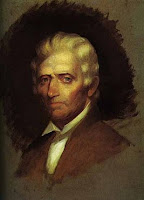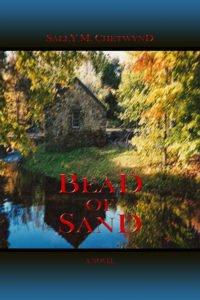 |
| Daniel Boone, 1820 |
On September 26, 1820, intrepid frontiersman Daniel Boone died, a few weeks short of his 86thbirthday. He had spent a lifetime exploring the frontier west of the Appalachians. The myth and legend surrounding this American icon grew rampant even in his lifetime.
The sixth of eleven children, Boone was born in 1734 in Berks County, PA, near present-day Reading. He spent his early days learning to hunt and fish from both white neighbors and friendly natives, and soon mastered musket, rifle, bow and arrow, and knife. Some of his many siblings and cousins married their Lincoln neighbors, the same family from which our 16thpresident descended.
In 1750, young Boone’s family pulled up stakes and followed the Conestoga wagons south and west through the Shenandoah Valley, and settled in the Yadkin Valley of North Carolina. In this forested, mountainous environment, Boone soon became famous for his skill as a hunter and woodsman.
After several excursions on his own, Boone began promoting the rich wilderness west of the Appalachians, organizing and leading expeditions through the Cumberland Gap to settle the fertile valley of the Kentucky River. He took his own family there in the 1770s, establishing Fort Boonesboro, which became a primary gateway for westbound pioneers.
One of the new settlers with wanderlust who accompanied Boone on one of these expeditions was Abraham Lincoln, grandfather of President Lincoln. Abraham’s family, equally restless, had followed Boone’s family south in 1768 and settled in Virginia’s Shenandoah Valley. Young Lincoln accompanied Boone two or three times before moving his wife and children to Kentucky in 1785.
Boone became a captain during the American Revolution, his militia patrolling the west against British-fostered Indian predations on white frontier communities, from western Virginia north to Ohio. Later in the war, he was made a lieutenant colonel. He led military expeditions against British outposts well after the official end of the American Revolution, counteracting British and Indian actions that did not let up after the surrender at Yorktown in 1781 and the treaties between Great Britain and the United States in 1784.
Much of the Boone mystique is fiction, but much of it is true. A certain John Filson published “The Discovery, Settlement And present State of Kentucke” in 1784, with a dramatically enhanced section about Daniel Boone’s exploits. All exaggeration aside, however, Boone was a dynamic leader and explorer, and an unparalleled marksman, deeply devoted to the solitude of the wilderness he roamed. His exploits were remarkable, considering the dangers of the times and places he frequented, far from civilization. Boone’s adventures influenced James Fenimore Cooper in writing “The Last of the Mohicans;” no doubt, many other writers were similarly inspired.
Even more remarkable is the fact that despite his dangerous profession, he not only attained considerable seniority, but also remained physically active well into his old age. He was the prototype for the strong pioneering spirit of the American West so embedded in our American culture.
Boone preferred the wilderness to the budding settlements in whose founding he was so instrumental. Although he often served as a civic leader in several communities where he lived over the years, he always ended up moving further west. He ultimately retired, if such a concept could be applied to such an individual, at his son’s home in Missouri. Retirement did not suit this trailblazer, however, who trekked in 1816 at age 81 with a hunting expedition to the Yellowstone River, which feeds into the upper reaches of the Missouri River in Idaho and Montana. Four years later, back in Missouri, he died of natural causes at his son’s home near present-day Defiance, MO.
Do you think that Daniel Boone has found sufficient elbow room in the afterlife? Or do you suppose he is still blazing trail?
SOURCES
History.com: This Day in History http://www.history.com/this-day-in-history/the-famous-frontiersman-daniel-boone-dies-in-missouri
Wikipedia: Daniel Boone http://en.wikipedia.org/wiki/Daniel_Boone
Pennsylvania Historical & Museum Commission http://pa.gov/portal/server.pt/community/people/4277/lincoln,_abraham/443566
“Daniel Boone” by Arthur Guiterman, poet (1871-1943) “The Saturday Evening Post” v. 196 No.32, February 9, 1924.
Boone portrait painted by Chester Harding in 1820.



